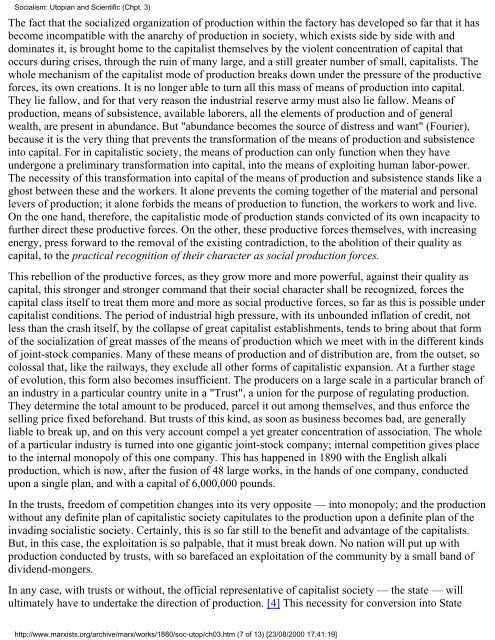Socialism: Utopian and Scientific - MIA
Socialism: Utopian and Scientific - MIA
Socialism: Utopian and Scientific - MIA
You also want an ePaper? Increase the reach of your titles
YUMPU automatically turns print PDFs into web optimized ePapers that Google loves.
<strong>Socialism</strong>: <strong>Utopian</strong> <strong>and</strong> <strong>Scientific</strong> (Chpt. 3)The fact that the socialized organization of production within the factory has developed so far that it hasbecome incompatible with the anarchy of production in society, which exists side by side with <strong>and</strong>dominates it, is brought home to the capitalist themselves by the violent concentration of capital thatoccurs during crises, through the ruin of many large, <strong>and</strong> a still greater number of small, capitalists. Thewhole mechanism of the capitalist mode of production breaks down under the pressure of the productiveforces, its own creations. It is no longer able to turn all this mass of means of production into capital.They lie fallow, <strong>and</strong> for that very reason the industrial reserve army must also lie fallow. Means ofproduction, means of subsistence, available laborers, all the elements of production <strong>and</strong> of generalwealth, are present in abundance. But "abundance becomes the source of distress <strong>and</strong> want" (Fourier),because it is the very thing that prevents the transformation of the means of production <strong>and</strong> subsistenceinto capital. For in capitalistic society, the means of production can only function when they haveundergone a preliminary transformation into capital, into the means of exploiting human labor-power.The necessity of this transformation into capital of the means of production <strong>and</strong> subsistence st<strong>and</strong>s like aghost between these <strong>and</strong> the workers. It alone prevents the coming together of the material <strong>and</strong> personallevers of production; it alone forbids the means of production to function, the workers to work <strong>and</strong> live.On the one h<strong>and</strong>, therefore, the capitalistic mode of production st<strong>and</strong>s convicted of its own incapacity tofurther direct these productive forces. On the other, these productive forces themselves, with increasingenergy, press forward to the removal of the existing contradiction, to the abolition of their quality ascapital, to the practical recognition of their character as social production forces.This rebellion of the productive forces, as they grow more <strong>and</strong> more powerful, against their quality ascapital, this stronger <strong>and</strong> stronger comm<strong>and</strong> that their social character shall be recognized, forces thecapital class itself to treat them more <strong>and</strong> more as social productive forces, so far as this is possible undercapitalist conditions. The period of industrial high pressure, with its unbounded inflation of credit, notless than the crash itself, by the collapse of great capitalist establishments, tends to bring about that formof the socialization of great masses of the means of production which we meet with in the different kindsof joint-stock companies. Many of these means of production <strong>and</strong> of distribution are, from the outset, socolossal that, like the railways, they exclude all other forms of capitalistic expansion. At a further stageof evolution, this form also becomes insufficient. The producers on a large scale in a particular branch ofan industry in a particular country unite in a "Trust", a union for the purpose of regulating production.They determine the total amount to be produced, parcel it out among themselves, <strong>and</strong> thus enforce theselling price fixed beforeh<strong>and</strong>. But trusts of this kind, as soon as business becomes bad, are generallyliable to break up, <strong>and</strong> on this very account compel a yet greater concentration of association. The wholeof a particular industry is turned into one gigantic joint-stock company; internal competition gives placeto the internal monopoly of this one company. This has happened in 1890 with the English alkaliproduction, which is now, after the fusion of 48 large works, in the h<strong>and</strong>s of one company, conductedupon a single plan, <strong>and</strong> with a capital of 6,000,000 pounds.In the trusts, freedom of competition changes into its very opposite — into monopoly; <strong>and</strong> the productionwithout any definite plan of capitalistic society capitulates to the production upon a definite plan of theinvading socialistic society. Certainly, this is so far still to the benefit <strong>and</strong> advantage of the capitalists.But, in this case, the exploitation is so palpable, that it must break down. No nation will put up withproduction conducted by trusts, with so barefaced an exploitation of the community by a small b<strong>and</strong> ofdividend-mongers.In any case, with trusts or without, the official representative of capitalist society — the state — willultimately have to undertake the direction of production. [4] This necessity for conversion into Statehttp://www.marxists.org/archive/marx/works/1880/soc-utop/ch03.htm (7 of 13) [23/08/2000 17:41:19]














![tyf Enf=O=n]lgg](https://img.yumpu.com/47584932/1/190x245/tyf-enfonlgg.jpg?quality=85)

